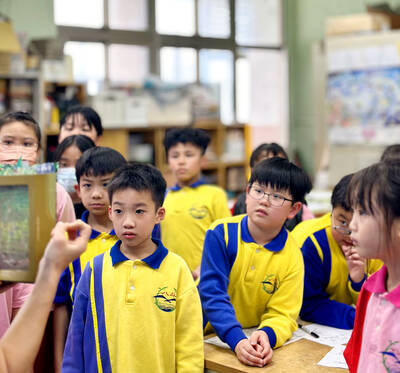Supermodel Lin Chi-ling (林志玲) is getting an image makeover with her role in Treasure Hunter (刺陵), a big-budget action flick scheduled to open next week. This is her second role in a feature movie. Clearly Lin is making the right kind of moves because Treasure Hunter stars Jay Chou (周杰倫), features a high-profile cast including Eric Tsang (曾志偉) and Chen Dao-ming (陳道明) and is directed by Kung Fu Dunk (功夫灌籃) director Chu Yin-ping (朱延平). This is a significant shift from Lin’s previous role as Xiao Qiao in John Woo’s (吳宇森) Red Cliff (赤壁). In Treasure Hunter, Lin casts off her demur demeanor and takes up sword and spear in a martial role akin to that of Angelina Jolie’s Laura Croft.
At a press conference in Singapore to promote the film, Lin said that she gave herself a seven out of 10 for her performance. Lin garnered mixed reviews for her presence in Red Cliff, but on this occasion she has certainly impressed other cast members, including Chou, with her energy and eagerness to learn. The United Daily News quoted Chou as saying: “When a beautiful woman fights, it looks good no matter what. That’s the important point.” Perhaps Chou wasn’t being so complimentary about Lin’s talent after all. Lin also took it upon herself to write the lyrics for the film’s theme song. Chou, who composed the music, dispensed with the services of Vincent Fang (方文山), the much sought-after lyricist, after seeing Lin’s efforts. “Next time we won’t have to book Fang,” Chou said. “He always has so much work on hand.”
With Treasure Hunter, Chou’s bid to make it in the movie business, on both sides of the camera, is clearly being established. Another singer who has dabbled in acting — and who now wants to take the director’s chair — is Wang Lee-hom (王力宏). According to the United Daily News, Wang has quietly begun shooting in China for a new feature film and has received support and advice from mentors Ang Lee (李安) and Jackie Chan (成龍). Chan’s own new feature film Big Soldiers (大兵小將), staring Wang, is scheduled for release early next year. In regard to his directorial style, Wang said he wanted to be a director like Ang Lee, someone who didn’t have to resort to shouting at people on set. “I’m not very good at telling people off,” he was quoted as saying.
Wang — once regarded as one of the hottest men in the Chinese-language entertainment industry — is nowhere to be seen in the Apple Daily’s poll of best looking men, with heartthrob Vic Chou (周渝民) of boy band F4 fame taking the top spot. Singer Jerry Yan (言承旭) took second place, and Ethan Ruan (阮經天) third. Takeshi Kaneshiro (金城武) placed fourth. The 36-year-old actor is doing well to have kept his place in the top five lookers despite his age. Fifth place went to Mark Chao (趙又廷) of the recent hit cop shop series Black & White (痞子英雄).
On the romantic front, Jolin Tsai (蔡依林) is back on the prowl and Next Magazine reports that following her traumatic breakup with Eddie Peng (彭于晏), she has picked up with model Godfrey Kao (高以翔). According to Next, Kao is keeping a low profile on his conquest as Tsai’s former boyfriend Peng is a buddy. This hasn’t prevented the paparazzi from catching the two flagrantly trying to avoid public scrutiny by leaving various nightspots surreptitiously, and by different exits.

May 26 to June 1 When the Qing Dynasty first took control over many parts of Taiwan in 1684, it roughly continued the Kingdom of Tungning’s administrative borders (see below), setting up one prefecture and three counties. The actual area of control covered today’s Chiayi, Tainan and Kaohsiung. The administrative center was in Taiwan Prefecture, in today’s Tainan. But as Han settlement expanded and due to rebellions and other international incidents, the administrative units became more complex. By the time Taiwan became a province of the Qing in 1887, there were three prefectures, eleven counties, three subprefectures and one directly-administered prefecture, with

It’s an enormous dome of colorful glass, something between the Sistine Chapel and a Marc Chagall fresco. And yet, it’s just a subway station. Formosa Boulevard is the heart of Kaohsiung’s mass transit system. In metro terms, it’s modest: the only transfer station in a network with just two lines. But it’s a landmark nonetheless: a civic space that serves as much more than a point of transit. On a hot Sunday, the corridors and vast halls are filled with a market selling everything from second-hand clothes to toys and house decorations. It’s just one of the many events the station hosts,

Two moves show Taichung Mayor Lu Shiow-yen (盧秀燕) is gunning for Chinese Nationalist Party (KMT) party chair and the 2028 presidential election. Technically, these are not yet “officially” official, but by the rules of Taiwan politics, she is now on the dance floor. Earlier this month Lu confirmed in an interview in Japan’s Nikkei that she was considering running for KMT chair. This is not new news, but according to reports from her camp she previously was still considering the case for and against running. By choosing a respected, international news outlet, she declared it to the world. While the outside world

Through art and storytelling, La Benida Hui empowers children to become environmental heroes, using everything from SpongeBob to microorganisms to reimagine their relationship with nature. “I tell the students that they have superpowers. It needs to be emphasized that their choices can make a difference,” says Hui, an environmental artist and education specialist. For her second year as Badou Elementary’s artist in residence, Hui leads creative lessons on environmental protection, where students reflect on their relationship with nature and transform beach waste into artworks. Standing in lush green hills overlooking the ocean with land extending into the intertidal zone, the school in Keelung